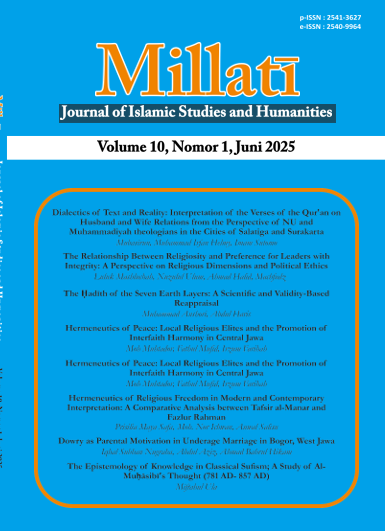Hermeneutics of Religious Freedom in Modern and Contemporary Interpretation: A Comparative Analysis between Tafsir al-Manar and Fazlur Rahman
DOI:
https://doi.org/10.18326/millati.v10i1.4194Keywords:
Tafsir al-Manar, Fazlur Rahman, Qur'anic hermeneutics, Religious freedom, PluralismAbstract
In response to the global challenges of rising intolerance and the politicization of religion, this study explores the hermeneutics of religious freedom in Islam through a comparative analysis of Tafsir al-Manar and Fazlur Rahman’s double movement methodology. Employing a qualitative comparative design grounded in philosophical hermeneutics, the research analyzes primary texts of Tafsir al-Manar and Rahman’s key works, supported by recent secondary literature. The findings indicate that al-Manar adopts a rational-contextualist approach that prioritizes communal protection against colonial-era religious coercion, whereas Rahman articulates universal ethical principles centered on freedom of conscience, resonating with contemporary human rights discourse. This study proposes an integrative hermeneutical model that synthesizes historical consciousness with universal ethics, enabling QS. Al-Baqarah (2:256) is to be interpreted both as a safeguard against forced conversion and as a timeless affirmation of religious freedom. The proposed model offers practical implications for policy development, particularly in the areas of religious freedom advocacy, interfaith dialogue, and inclusive Islamic educational curricula. This research contributes to Qur'anic hermeneutics by bridging traditional exegesis and modern ethical concerns, offering a framework that is both contextually grounded and normatively responsive to pluralistic Muslim societies.
References
Adam, Ibrahim I. “Islamic Modernism and Tafsir in Nineteenth Century Egypt: A Critical Analysis of Muhammad Abduh’s Exegesis.” Journal of Quranic Sciences and Research 4, no. 1 (2023). https://doi.org/10.30880/jqsr.2023.04.01.006.
Antania, Lusiana A. “Pengaruh Pemisahan Hak Aliran Kas Dan Hak Kontrol Terhadap Manajemen Laba Akrual Dan Manajemen Laba Riil.” Jmbi Unsrat (Jurnal Ilmiah Manajemen Bisnis Dan Inovasi Universitas Sam Ratulangi) 10, no. 2 (2023): 1050–69. https://doi.org/10.35794/jmbi.v10i2.50083.
Arifin, A P O, M B Rahmat, and M Tauhid. “Kerukunan Umat Beragama: Perspektif Tafsir Al-Azhar Karya Buya Hamka.” In UInScof Conference Proceedings, 2024.
Arisdiyanto, Fikri. “Pluralisme Dan Toleransi Beragama: Studi Hermeneutika Interpretatif Atas Esensi Keagamaan Pada Hadis Riwayat Al-Bukhari No. 1311.” UIN Sunan Ampel Surabaya, 2022.
Daffa, Muhammad. “Ahli Kitab Dalam Al-Qur’an (Perspektif Muhammad Rasyid Ridha Dalam Tafsir Al-Manar).” PTIQ Jakarta, 2022. https://repository.ptiq.ac.id/id/eprint/738.
Dahlan, Moh. “Islamic Sharia Reform of Ahmadiyah Sect in Indonesia.” HTS Teologiese Studies / Theological Studies 77, no. 4 (2021). https://doi.org/10.4102/hts.v77i4.6396.
Fahrurrozi. “Implementasi Metode Hermeneutika Double Movement Dalam Menafsirkan Ayat-Ayat Khilafah (Studi Pemikiran Fazlur Rahman).” UIN Mataram, 2022. https://etheses.uinmataram.ac.id/4290.
Fazeli, Hamidreza, Alireza Fazeli, and Shokrollah Fararooeic. “Critical Study of Tafsir Al-Manar (Interpretation of the Holy Quran) Regarding the Miracles of Prophet Ibrahim (PBUH) and Prophet Moses (PBUH).” International Journal of Health Sciences, 2022, 6977–88. https://doi.org/10.53730/ijhs.v6ns2.6678.
Gadamer, Hans-Georg. Truth and Method. 2nd editio. London: Continuum, 2004. https://doi.org/10.5040/9781472546304.
Guirguis, Laure. Copts and the Security State: Violence, Coercion, and Sectarianism in Contemporary Egypt. Stanford University Press Stanford, California, 2016. https://doi.org/10.1515/9781503600805.
Halimatussa’diyah, Halimatussa’diyah, Deddy Ilyas, and Eko Zulfikar. “The Minangkabau Interpretation of the Qur’an: Tradition and Characteristics of the Minangkabau Interpretation of the Qur’An.” Al Quds Jurnal Studi Alquran Dan Hadis 7, no. 3 (2024): 613. https://doi.org/10.29240/alquds.v7i3.8584.
Hamdan, M. “Filosofi Kafir Dalam Al-Qur’an: Analisis Hermeneutik Schleiermacher.” Tashwirul Afkar Vol. 38, no. No. 02 (2020): 285. https://www.academia.edu/68449729.
Hamim, Khairul, and Muhammad M Abdillah. “Renaissance of Islam: A Content Analysis of Muhammad Rashīd Riḍā’s Exegesis.” Journal of Islamic Thought and Civilization 13, no. 2 (2023): 104–19. https://doi.org/10.32350/jitc.132.07.
Downloads
Published
How to Cite
Issue
Section
License
Copyright (c) 2025 Prisilia Maya Safa, Moh. Nor Ichwan, Auwal Salisu

This work is licensed under a Creative Commons Attribution-ShareAlike 4.0 International License.







